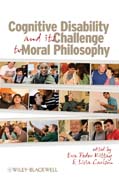
Cognitive disability and its challenge to moral philosophy
Kittay, Eva Feder
Carlson, Licia
We have been taught that all humans share intrinsic qualities that lend them a common dignity. Philosophers conceive of a certain level of cognitive capacity as the very mark of humanity, and extend the mantle of equal moral fellowship to these ‘persons.’ But what of individuals with diminished cognitive abilities? Cognitive disability poses significant challenges to these fundamental philosophical concepts, prompting a variety of difficult questions. Should those with cognitive disabilities be excluded from the protections and responsibilities we routinely assign to ‘persons’? Are we forced to reconsider the very concept ‘personhood’? How should the interests of people with cognitive disabilities and their caregivers be represented politically? Who is responsible for guaranteeing their care? And to what extent ought they be granted autonomy? Cognitive Disability and Its Challenge to Moral Philosophy addresses these concerns in a series of thought-provoking essays contributed by some of the most prominent moral philosophers of our time, as well as clinicians and medical historians. Collectively, the essays represent an important milestone in contemporary thinking about ethical considerations relating to people with cognitive disabilities.
- ISBN: 978-1-4051-9828-8
- Editorial: Wiley-Blackwell
- Encuadernacion: Rústica
- Páginas: 424
- Fecha Publicación: 22/01/2010
- Nº Volúmenes: 1
- Idioma: Inglés
